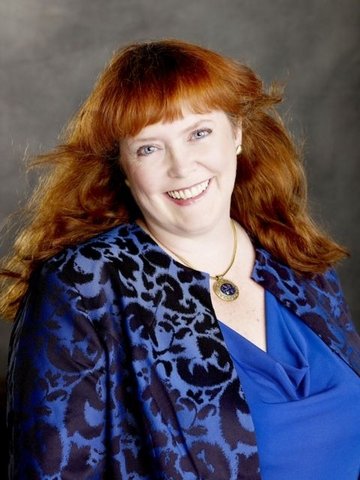Dr Rosalind Bergemann
Think of the term Aspergers, what images do you get? Someone who’s incapable of learning? Someone with some kind of mental illness?
These are stereotypes and negative ones to boot. But negatively is how those with Aspergers are largely viewed.
What if I were to say that people with Aspergers are often very talented? Witness the likes of Bill Gates, Albert Einstein, Woody Allen, Michael Palin, Susan Boyle, Darryl Hannah and Bob Dylan- I could go on. Does that change your view of Aspergers?
My Page 1 Woman, Dr Rosalind Bergemann, has Aspergers and is talented. She hasn’t allowed negative stereotypes to define her. In fact she’s turned her Aspergers’ into an advantage that has helped her to succeed. For example, she went up to university at the age of 15, and since then has gained several degrees, an MBA, a DBA and a PhD. And she’s a published author of 4 novels and has set up and runs two businesses.
How does she do it? ‘I didn’t have any friends, but that tends to happen with Autism. You don’t get the social side but you get the knowledge’ she said.
She first became a manager when just aged 19, but that didn’t stop her from challenging gender inequality at work. “I was able to say ‘it doesn’t matter if you’re a man or a woman. It’s what you do that counts’.”
A double CMI award winner she has bags of energy, positivity, self-belief, and a powerful aura. And she’s a confident and fearless self-leader – a Page 1 Woman for sure. Here she is in her own words.
Describe your work and what you do.
Dr Rosalind Bergemann: Predominantly, I’m a business transformation specialist advising organisations going through change and CEO of Globalite Management Services Ltd, a management consultancy. I’m also chair of the organisation Asperger Leaders, and have a couple of other non-executive roles.
The one word that describes me is mentor. Whether I’m advising or transforming businesses, or working with people through Asperger Leaders, I’m aiming to give them as much of my knowledge as I can so that they can grow themselves.
Asperger Leaders was started in 2010 to fill a gap that I’d seen in the marketplace. I was diagnosed with Asperger’s Syndrome around 2009. Since that time, I became aware of some of the reasons why I’d had some challenges in the workplace and also that it was difficult to get support if you’re a business leader. There’s a terrible stigma attached to Aspergers. People think it’s a mental illness rather than a neurological difference. Many leaders feel they should stay in the closet about their diagnosis.
So we mentor and support leaders with Aspergers, and train employers to work with people with hidden disabilities. Everyone working in the organisation has Aspergers. We’ve over 200 members, all leaders in business. We offer development programmes on coping with our specific challenges around being a leader, e.g. sitting on a board when you have Aspergers; dealing with a PA or networking when you’ve never been able to communicate well.
What steps did you take to get you to where you are today?
Dr Rosalind Bergemann: It’s important to study and get knowledge and qualifications. It’s such a competitive environment. I’ve never stopped studying, ever.
I’ve also found that the key to me developing as a leader was speaking out and taking risks. It’s a male-dominated environment. In the ‘80s when I became a manager, it was a case of you’d been privileged to be allowed to be one of us so how dare you disagree with us. You had to be prepared to take the risk and say, “I don’t agree.” That was very unusual. For example, as a manager at a private clinic, I disagreed at a board meeting with the CEO/medical director, an intimidating man who people feared. But I earned his respect through doing that.
Another important thing was not being afraid to ask questions and learn from others. As women and trying to prove ourselves we don’t ask questions in case we’re seen as not knowledgeable. But I found it valuable being confident enough to say, “I don’t understand that. Explain to me. Let me learn from you.”
What was the most significant thing you did as a woman that got you into your current position?
Dr Rosalind Bergemann: Being an outsider in a male-dominated environment without feeling a need to become male in my working and thinking. A lot of women have been forced, in order to progress, to become one of the men. I wasn’t prepared to do that. I was prepared to stand up and question. If a less experienced man was put forward for a job instead of me, I would ask why.
What was your greatest challenge and how did you overcome it?
Dr Rosalind Bergemann: I moved into leadership quite early so people were thinking, “Who’s this youngster coming in?” I’m 20 years old and I’ve got mainly men in their 40s reporting to me. I had to learn how to relate to people which doesn’t comes naturally to me. So that was a particular challenge.
I’ve got extremely sensitive hearing so people don’t realise I can hear them when they’re over there whispering. I would walk over and say, “Do you have a problem with this and do you think there’s something else we can do?” Not only challenging as in, “I know what you’ve just said,” but also encouraging them to suggest anything better. It was a combination of not letting people undermine me – firmly not accepting ridicule or derogatory statements, but also encouraging them to grow. And those things worked very well together.
What was your most revelatory moment?
Dr Rosalind Bergemann: For many years I knew I was different but I didn’t know why. You always think the worst. “I’m an alien left behind on the wrong planet!”
You literally have to think every moment of the day to make sure you’re doing and saying the right thing and not offending people.
I thought I had a failing hanging over my head. I didn’t see my strengths. I was focussing on my weaknesses. And then one of the courses for my Life Sciences degree was on autism and it talked about Aspergers which I’d never heard of. The more I read, the more I thought, “This is me.”
I went to get tested. As soon as I knew that I had Aspergers, it brought incredible freedom. Soon I was seeing strengths again and not just saying to myself, “I’m weird”.
I then researched the areas that we struggle with. We’re too blunt. We don’t recognise body language. We’re very honest. It was a case of, “I need to learn how to read body language.” I got books on it. I started thinking more about what I said in emails. I reread things before I sent them to make sure they read right. Little things like that made a huge difference
It improved my relationships too. When work friendships became more social, it was, “I don’t know what to do or say?” Men would say I was flirting. Women would say I was being aggressive. I couldn’t tell. When I got the diagnosis, I researched what I should be doing socially. When are you being too friendly and when should you withdraw? How close do you stand to people? I didn’t know these things. I became more confident.
What resource has been crucial to your success?
Dr Rosalind Bergemann: Something that’s unique to Aspergers is being able to see big picture and intricate detail at the same time. Unlike a lot of people I can see both – I’m a visual thinker. For example, a high profile company had a vision for a new body. I gave them a vision for the whole organisation, globally, which I explained and made tangible. I was also able to say, we’ve got to look at the basics too, things on the ground – how to have the offices; the nuts and bolts of the operating systems; the skills; the structures that you need to put into place to do that. They were surprised. They expected to get a second person to help with the business analysis.
What do you understand by leadership and how does it inform your role as a woman leader?
Dr Rosalind Bergemann: A leader is someone who can give a vision and inspire people to achieve it. A leader also grows and develops people who work with them to become the best that they are.
This has always shaped my leadership. Not only do I seem to have inspired people but I automatically aim to help people to reach their greatest potential. Many people that have worked for me are now in leadership roles.
I had a receptionist in an organisation I was with. I thought she had such potential but she couldn’t see it. I transferred her to my consultancy team. She said, “I can’t do that.” I said, “Yes, you can.” I let her start as my assistant. And as we started doing programmes, I would hand over to her in the middle and she would continue. She is now a principal consultant at Deloitte.
What difference do you think it made being a woman leader?
Dr Rosalind Bergemann: Initially, it was incredibly challenging being a woman leader because you were seen as inferior. I rejected getting ahead by being masculine or wearing tight dresses and stilettos. People needed to accept me for how I performed and the difference that I made.
It meant that it was harder to be a leader. Whilst men just assume they’re going to go into leadership, women often have to work their way up through clerical and feel they have to earn their leadership. There’s no reason why we cannot be a leader without taking a clerical route. In some respects, we have an advantage over men because women tend to have more insight into people that they work with.
What are your top tips for women who want to be leaders in their field?
Dr Rosalind Bergemann: Believe in your abilities as a leader and a professional.
Get valuable qualifications. If studying isn’t your thing, make the effort. In today’s competitive environment it’s worth doing.
Visualise where you want to be. There’s nothing stronger than the power of positive thinking. If you see yourself as a director of a certain area at a certain time, you can get there step by step, visualising the path.
Mentor your team. If you help your people grow, even if they leave your company for a more senior role, they’ll never forget your commitment to them. You’ll earn your reputation as a leader.
Have a hobby. My main hobby is writing novels. It’s an opportunity to switch off and not isolate yourself. Make time for family and friends, through your hobby or aside from it. It’s no good being a leader who is there for your people but you’re isolated and alone at home.
I’m looking forward to the days when women leaders are not a minority. So when we talk about a leader, we aren’t saying a woman leader or a man. And the way to do that is by us getting up there.
Find out more about Asperger Leaders on LinkedIn, Facebook, YouTube and Twitter and by clicking here. And click here for more on Globalite Management Services Ltd.
Are you a person with Aspergers or do you know someone who is? Were you inspired by Dr Rosalind Bergemann?
It would be great to hear from you. Leave a comment below. Many thanks.
And why not share with your friends on Twitter, LinkedIn and Google+?

